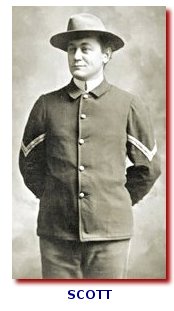 with a receptionfeaturing music, some talks, and refreshments. The dean, James B. Scott, wasn’t
there.
with a receptionfeaturing music, some talks, and refreshments. The dean, James B. Scott, wasn’t
there.
Thursday, February 5, 2009
Page 15
REMINISCING (Column)
Los Angeles Law School Dean Becomes Army Private
By ROGER M. GRACE
The first school year of
the Los Angeles Law School ended on June 21, 1898, with a receptionfeaturing music, some talks, and refreshments. The dean, James B. Scott, wasn’t
there.
with a receptionfeaturing music, some talks, and refreshments. The dean, James B. Scott, wasn’t
there.
He was in San Francisco doing some legal work—and acting as a clerk. He was assisting the judge advocate at the Presidio.
The Spanish-American War had broken out in April, and Scott enlisted the next month as a private. He was back in Los Angeles, however, in time for the beginning of the new school year in September, the war having ended in August. Scott was, by then, a corporal.
The war was fought to “liberate Cuba” from Spain. In retrospect, it’s widely thought that the American people clamored for war based on embellishments as to conditions in Cuba appearing in newspapers…in particular those owned by William Randolph Hearst.
Hearst had commissioned Frederic Remington—the artist known for his sketches and paintings of the old west—to go to Cuba for the purpose of providing illustrations of the war, once it broke out. You’ve probably read that Remington cabled Hearst from Havana that things were quiet, it didn’t look like a war would occur, and he wanted to come home, to which the newspaper magnate responded:
“Please remain. You furnish the pictures and I’ll furnish the war.”
It’s now questioned whether Hearst did dispatch such a cable. Ralph Keyes’ 2006 book “The Quote Verifier: Who Said What, Where, and When” discloses:
“There is no reliable evidence that the publisher sent any such telegram. He himself denied having done so.”
Whether Hearst’s sending of such a message is fact or fantasy, it does appear that the need which the public perceived for U.S. intervention was predicated on exaggerations. Scott discerned that at the time.
At the first regular meeting of the University Club on May 4, 1898, Scott explained in a talk why he thought the war was unnecessary. The next day, he joined up. Why, if he opposed the war, did he offer services in aid of it? Scott provided an explanation in an address before the University Club on Dec. 15, 1898.
The Dec. 16 edition of the Los Angeles Times quotes him as saying:
“Now that the muzzle of military service is taken off, I will again say that the war was an outrage. It was not a failure or a fizzle. The war was promoted by designing persons, hastened by the newspapers, and precipitated by Congressmen, who were willing to resort to desperate means to aid their prospects for reelection. It was not fought for a humanitarian purpose. Before the war began there was endless talk about the sufferings of the reconcentrados [Cubans who had been moved into camps]. As soon as the war was started Cuba was blockaded. Nothing more was heard about the reconcentrados, and yet starvation by the United States is as bad as starvation by Spain….
“Believing these things, why did I enlist? Because when war has begun, it is no time for citizens to criticise the government or question the right or wrong of the cause for which the nation is fighting. Patriotism demands that citizens shall give no aid nor comfort to the enemy.”
It does seem difficult to reconcile Scott’s post-war proclamation that citizens should not criticize a war in progress with his own derision of the war effort a month after it commenced.
The University Club at which Scott spoke, by the way, had no relationship to the eating facility of the same name that exists at USC. It was a private and prestigious men-only club which endured until the early 1990s. Scott founded it in 1898. In the end, the club had its own building on Sixth Street in downtown Los Angeles. Its headquarters during its formative stage was in Scott’s office in the Wilcox Building at Second and Spring Streets.
Copyright 2009, Metropolitan News Company